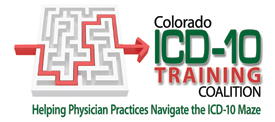ICD-10 update

ICD-10 coalition: Year-end wrap up
Marilyn Rissmiller, Senior Director, Health Care Financing
Since the Colorado ICD-10 Training Coalition launched last year, we’ve used a strategic approach to help build awareness among practices, assist them with developing implementation timelines, help them plan and prepare, and provide training and testing opportunities. Now many of the practices that have been on this journey with us have begun or are well on their way with the necessary transition planning and preparation.
As many practices have realized, transition is not actually the final step in your ICD-10 journey. Staff will continue to adapt to an ongoing process, changing strategies to adapt to provider needs, and we as a coalition will continue working with you to ensure success.
During a Dec. 17 webinar, our panel of experts and practice staff reflected on the past year and gave advice for others, no matter where they are on their timeline.
Todd Welter, CPC, founder and president of R.T. Welter and Associates, spoke about the “OMG Curve” that many are no doubt experiencing or about to experience as the Oct. 1, 2014 deadline approaches. This curve maps the work trajectory of a big project, understanding human nature to procrastinate in the beginning then panic as time runs out. Ideally practices are evenly spacing your steps and moving along the pathway strategically to avoid the OMG Curve. He told the listeners that it’s not too late to plot a steady path, though those who haven’t started the process yet may soon realize that it’s getting “pretty darn close.”
Welter encouraged working in teams, even outside of your practice. “No practice is able to do everything a patient might need so we’re working in partnership with other health care professionals. This means we have to make sure that not only our practice is ready but that all of the partners are also ready,” he said.
There are some payers [workers’ compensation and auto insurers] that may continue to stay on ICD-9 after Oct. 1, and practices may have to work on a dual system to accommodate this. Health plans may be working on legacy systems, which could affect claims and slow cash flow for a practice regardless of whether the practice has transitioned successfully. Be prepared.
Christine Hall of Mountain View Medical Group described her experience with ICD-10 so far. They started with chart audits and found that many of their providers were using unspecified codes. They decided to better define the ICD-9 codes to improve documentation. Their IT department is adding codes to their electronic medical record and they’ve hired an extra coder whose focus will be guiding physicians and staff on ICD-10.
“Physician reaction is mixed,” Hall said. “A lot are feeling that this is ‘just another thing to do’ as we’re also implementing the patient-centered medical home. We’re trying to be as positive as we can and ease them into it.”
Sandra Robben-Webber of Colorado Springs Pulmonary Consultants completed an impact analysis earlier in 2013 and has been working with their software vendor and clearinghouse to make sure they’re on track. While she felt she wasn’t getting as much done as was needed, especially over the summer, she says she discovered when pulling information into a matrix for the webinar that they’d accomplished more than she realized just by “doing a couple of things every day.”
“I think we’re on a good pathway going into 2014,” Robben-Webber said. “I’m glad we started earlier than later but I do still feel there’s time to utilize resources. Choose what resources will work for you and reach out to the coalition members. I really commend the coalition on what they’ve put together this year.”
The coalition is in the process of putting together the 2014 work plan and, with just nine months remaining until implementation, polled webinar participants on their progress and needs.
- 34.1 percent said planning is well underway
- 43.2 percent said planning is in the early stages
- 13.6 percent said they will begin planning after the holidays
- 9.1 percent said they are not responsible for the plan
For resources moving forward, participants overwhelmingly reported that they need “all of the above”: webinars on planning and preparation, coding training, access to peer support groups and one-on-one counseling. The Colorado ICD-10 Training Coalition will continue to develop resources. Visit our website at www.cms.org/icd-10 for on-demand webinars, checklists, worksheets and more.
Posted in: Colorado Medicine | Practice Management | Coding and Billing

Comments
Please sign in to view or post comments.